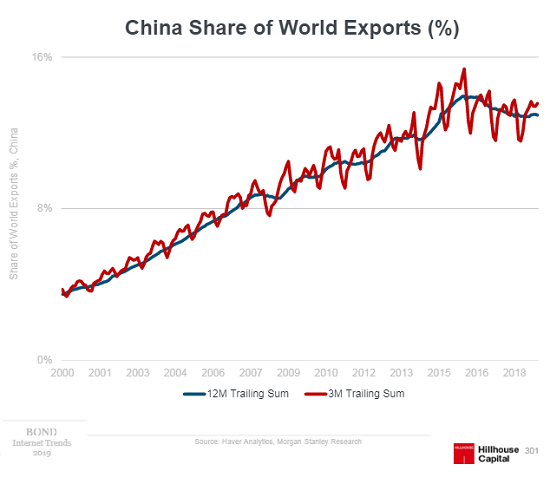Each party will continue to extract whatever benefits they can from the other, but the leaving is already well underway.
Beneath the euphoric hoopla of a trade deal with China is the cold reality that the divorce has already happened and any trade deal just signs the decree. The divorce of China and the U.S. was mutual; each had used up whatever benefits the tense marriage had offered, and each is looking forward to no longer being dependent on the other.
Any trade deal is like closing the barn door months after the horses left. Corporate America's supply chains are already leaving China for lower cost, friendlier countries, and for its part China has already made its intentions to escape the grip of the U.S. dollar abundantly clear.
Indeed, China has clearly stated its plan to move up the value chain globally and rely more on its domestic consumers to fuel growth rather than exports, which have been weakening for some time (see chart below).
As for supply chains leaving China for good--have you examined the labels of consumer goods recently? What once invariably read "made in China" increasingly reads "made in..." The reasons are numerous:
1. China's labor costs are soaring. Many other countries have lower-cost labor forces.
2. The welcome mat for foreigners has been pulled away. If you need evidence, look at the swelling flood of ex-pats leaving China for good, an exodus that began years ago.
3. China's workforce is shrinking as the populace ages. The demographics of the one-child policy are remorseless.
4. China's repression of Muslim minorities doesn't seem to bother Islamic governments but it presents a serious issue to global Corporate America.
Imagine what would happen to (say) Apple's reputation if even the tiniest part of an iPhone was traced to China's slave-labor force of Muslim minorities. Whatever Apple might save by keeping its supply chain in China would be more than offset by the global PR damage.
For Corporate America, the lowest-risk strategy is to move the supply chain out of China, the sooner the better: lower costs and lower exposure to IP theft and bad PR.
The tide of Chinese students studying in the U.S. on their government's tab is ebbing. China's authorities are playing the trade war as a patriotic battle, and so why pay for students to study abroad?
Chinese corporations are increasingly reluctant to invest in American assets as skepticism about China's agenda rises.
Signing the trade deal is signing the divorce decree, not a signal of a return to the good old days of wine and romance. Each party will continue to extract whatever benefits they can from the other, but the leaving is already well underway.
 My recent books:
My recent books:
NOTE: Contributions/subscriptions are acknowledged in the order received. Your name and email remain confidential and will not be given to any other individual, company or agency.
| |
Thank you, Thomas H. ($5/month), for your marvelously generous contribution to this site-- I am greatly honored by your support and readership.
| |




























